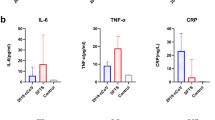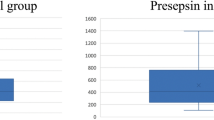Summary:
Treatment with antibodies against T-lymphocytes usually triggers a febrile response potentially mimicking or masking infection. Procalcitonin (PCT) is considered a sensitive and specific marker of systemic bacterial and fungal infection. It was the aim of this study to investigate the characteristics of PCT and C-reactive protein (CRP) during treatment with polyclonal or monoclonal anti-T-cell antibodies, in order to examine the ability of these parameters to distinguish between systemic bacterial infection and reaction to antibody treatment. Thus, 15 consecutive febrile episodes after T-cell antibody infusion without clinical signs of infection were compared with nine episodes of Gram-negative sepsis. After T-cell antibody infusion PCT and CRP serum levels increased to a similar extent as in Gram-negative sepsis. Therefore, during T-cell antibody treatment neither PCT nor CRP are adequate for differentiating between fever due to infection or to unspecific cytokine release.
This is a preview of subscription content, access via your institution
Access options
Subscribe to this journal
Receive 12 print issues and online access
$259.00 per year
only $21.58 per issue
Buy this article
- Purchase on Springer Link
- Instant access to full article PDF
Prices may be subject to local taxes which are calculated during checkout



Similar content being viewed by others

References
Dearden C, Foukaneli T, Lee P et al. The incidence and significance of fevers during treatment with antithymocyte globulin for aplastic anaemia. Br J Haematol 1998; 103: 846–848.
Peltola H, Jaakkola M . C-reactive protein in early detection of bacteremic versus viral infections in immunocompetent and compromised children. J Pediatr 1988; 113: 641–646.
Legouffe E, Rodriguez C, Picot MC et al. C-reactive protein serum level is a valuable and simple prognostic marker in non Hodgkin's lymphoma. Leukemia Lymphoma 1998; 31: 351–357.
Dornbusch HJ, Kerbl R, Lackner H et al. Procalcitonin and C-reactive protein levels at the time of engraftment after stem cell transplantation. Acta Chir Austr 2000; 32: 37 (abstract P38).
Assicot M, Gendrel D, Carsin H et al. High serum procalcitonin concentrations in patients with sepsis and infection. Lancet 1993; 341: 515–518.
Fleischhack G, Kambeck I, Cipic D et al. Procalcitonin in paediatric cancer patients: its diagnostic relevance is superior to that of C-reactive protein, interleukin-6, interleukin-8, soluble interleukin-2 receptor and soluble tumour necrosis factor receptor II. Br J Haematol 2000; 111: 1093–1102.
Nijsten MW, Olinga P, The TH et al. Procalcitonin behaves as a fast responding acute phase protein in vivo and in vitro. Crit Care Med 2000; 28: 458–461.
Lacour AG, Gervaix A, Zamora SA et al. Procalcitonin, IL-6, IL-8, IL-1 receptor antagonist and C-reactive protein as identificators of serious bacterial infections in children with fever without localising signs. Eur J Pediatr 2001; 160: 95–100.
Kuse ER, Jaeger K . Procalcitonin increase after anti-CD3 monoclonal antibody therapy does not indicate infectious disease. Transplant Int 2001; 14: 55 (letter).
Sabat R, Hoflich C, Docke WD et al. Massive elevation of procalcitonin plasma levels in the absence of infection in kidney transplant patients treated with pan-T-cell antibodies. Intens Care Med 2001; 27: 987–991.
Eberhard OK, Langefeld I, Kuse ER et al. Procalcitonin in the early phase after renal transplantation – will it add to diagnostic accuracy? Clin Transplant 1998; 12: 206–211.
American College of Chest Physicians/Society of Critical Care Medicine Consensus Conference Committee. Definitions for sepsis and organ failure and guidelines for the use of innovative therapies in sepsis. Crit Care Med 1992; 20: 864–874.
Hayden WR . Sepsis terminology in pediatrics. J Pediatr 1994; 124: 657–658.
Acknowledgements
We are indebted to Andrea Berghold and Petra Ofner from the Institute for Medical Informatics, Statistics and Documentation for their professional assistance in statistical analysis.
Author information
Authors and Affiliations
Corresponding author
Rights and permissions
About this article
Cite this article
Dornbusch, H., Strenger, V., Kerbl, R. et al. Procalcitonin and C-reactive protein do not discriminate between febrile reaction to anti-T-lymphocyte antibodies and Gram-negative sepsis. Bone Marrow Transplant 32, 941–945 (2003). https://doi.org/10.1038/sj.bmt.1704265
Received:
Accepted:
Published:
Issue Date:
DOI: https://doi.org/10.1038/sj.bmt.1704265
Keywords
This article is cited by
-
Chemotherapy-related fever or infection fever?
Supportive Care in Cancer (2021)
-
Malignancy and chemotherapy induced haemophagocytic lymphohistiocytosis in children and adolescents—a single centre experience of 20 years
Annals of Hematology (2018)
-
Inflammatory Markers in Patients after Hematopoietic Stem Cell Transplantation
Archivum Immunologiae et Therapiae Experimentalis (2013)
-
Diagnostic biomarkers of pro-inflammatory immune-mediated preterm birth
Archives of Gynecology and Obstetrics (2013)
-
Influence of maternal age, gestational age and fetal gender on expression of immune mediators in amniotic fluid
BMC Research Notes (2012)


